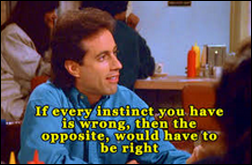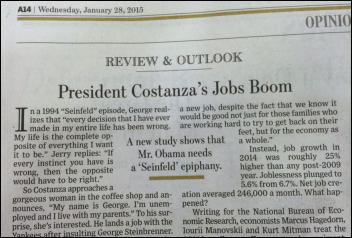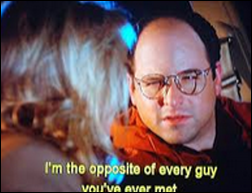Anything related to defense will need to go to Genesis.
Startup CEOs and Investors: Bruce Brandes
Startup CEOs and investors with strong writing and teaching skills are welcome to post their ongoing stories and lessons learned. Contact me if interested.
All I Needed to Know to Disrupt Healthcare I Learned from “Seinfeld”: Part I – Do The Opposite
By Bruce Brandes

In my continued efforts to learn from progressive healthcare thought leaders, I recently read Eric Topol’s new book “The Patient Will See You Now.” I was heartened to see Dr. Topol’s opening chapter illustrate his first point with an intellectual / cultural equilibrium I can appreciate … through an amusing story from “Seinfeld” about Elaine’s medical record woes. That anecdote caused me to reflect on how my favorite iconic TV show about nothing is instructive for the entrepreneurs who strive to reinvent our healthcare delivery system.
Cautionary note: my comments in this series will assume that HIStalk readers have at least a baseline knowledge in all things “Seinfeld.” I apologize in advance to the two or three folks out there who have not seen (or heaven forbid, did not like) “Seinfeld.”
Do The Opposite


If you are relatively new to healthcare (and missed Vince Ciotti’s insightful HIStalk series on the history of healthcare IT), you may have asked yourself how Epic became so epic. Like George Costanza’s approach in landing a job with the New York Yankees, Epic did the opposite of what every other healthcare information systems vendor did.
Most enterprise clinical systems originated as either hospital-centered extensions of patient billing systems, intended to capture just enough clinical information to get the bills out the door (SMS and HBOC) or as an expansion of a niche departmental system (Cerner and Meditech). Epic, on the other hand, began as an ambulatory system focused on winning the hearts and minds of the physicians. Those same physicians would later have significant influence over hospital decision-making.
Rather than deploying armies of salespeople, Epic let their customers sell for them. Rather than making shortsighted decisions to placate quarterly earnings reports, Epic remained privately held. Rather than growing by multiple acquisitions, Epic expanded organically and built their own software on a common database. Epic had successfully broken down the departmental silos of laboratory, radiology, and pharmacy as well as ambulatory and inpatient records so that the health system could be unified on a singular platform.
However, the radical changes underway in our healthcare system now create an interesting parallel from Epic’s history lesson. Hospitals that are lauded for successfully unifying on a single EMR are as limited today in an Accountable Care Organization or Clinically Integrated Network as the historical single hospital was limited by the siloed departmental systems. To achieve population health, information must be openly shared across disparate systems and organizations. The sky-high costs, antiquated technology, and limited interoperability inherent in these legacy healthcare IT investments may prove to be the Waterloo for hospitals struggling for economic viability and competitive relevance in need of flexibility and agility in a value-based care world.
Emerging, disruptive companies should learn from history – and do the opposite. What might “opposite" look like from the traditional vendors with whom healthcare organizations have become accustomed? Some ideas and examples:
- Free vs. expensive (Zenefits, Practice Fusion)
- Payments aligned with benefits vs. massive capital outlays with vague ROI promises (Athenahealth)
- A better experience at a lower cost vs. causing customer dissatisfaction at higher additional costs (Theranos)
- Simple vs. complex to buy, implement, and use (Apple)
- Openly shared, interoperable data vs. closed, proprietary systems (anything built in the last few years)
- Mobile-first (information to you) vs. desktop (you go to the information) (AirStrip, Voalte)
- Cloud-based SaaS vs. installing and maintaining software (Salesforce)
But beware, big-bang industry disruptors. Over the last several decades, the healthcare IT road (except a certain one-mile stretch of Arthur Burkhardt Expressway) has been littered with major international corporations that saw gold, Jerry, GOLD, in healthcare and failed (American Express, McDonnell Douglas, Alltel, etc.). Healthcare is indeed a “bizarro” industry – almost the opposite of every industry you’ve ever encountered.
That said, the underlying economic, technical, and clinical restrictions that have historically hindered change are lessening. New mainstream technologies that we all use in our everyday lives are resetting expectations of the tools we use in our healthcare workplace.
Now is the time for innovative entrepreneurs to consider jumping into the healthcare pool – but make sure your target market’s water isn’t too cold in order to avoid “shrinkage” of your investment.

"My life is the complete opposite of what I want it to be. I should’ve done the complete opposite of whatever I’ve done up till now.”
Is this quote from George Costanza or a healthcare system you may know?
Bruce Brandes is managing director at Martin Ventures, serves on the board of advisors at AirStrip and Valence Health, and is entrepreneur in residence at the University of Florida’s Warrington College of Business.


Love it! Why do they call it Ovaltine?
Worth noting that Epic (unlike Meditech, Eclipsys, Allscripts etc. ad nausem) were able to use a robust and scalable Intersystems platform and placed ‘Hyperspace’ on top of it. The global structures and internal design have not changed since Judy cranked them out in her garage 35 years ago. Before this, Epic was largely considered a joke system, much like Meditech is today.
Talk about reusability.